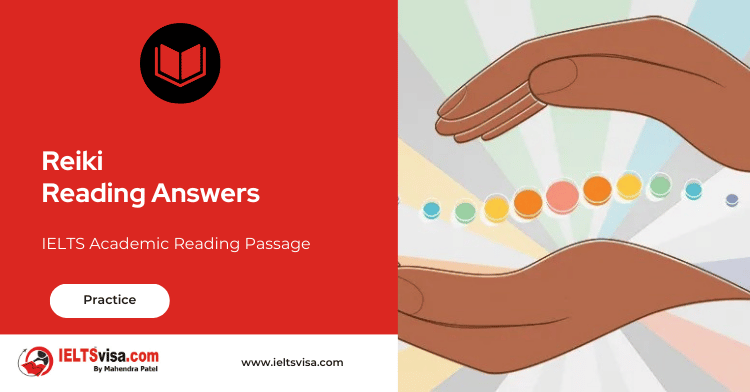Reiki Reading Answers
IELTS Academic Reading Passage
A The spiritual practice of Reiki was first introduced in the early 20th century in Japan and continues to be used by its followers today with the intention of treating physical, emotional and mental imbalances and consequent ill-health. The principles of Reiki involve techniques employed by practitioners they say will channel healing energy through the subject’s body, and advocates hold that these techniques can also be used for self-healing. The name of the practice itself stems from two Japanese characters, pronounced ‘rei’ which translates to ‘unseen’ or ‘spiritual’ and ‘ki’ meaning ‘life force’ or ‘energy’.
B According to Reiki philosophy, only by undergoing an attunement process performed by a Reiki Master is an individual able to access, then channel this positive energy within, this ability once established is considered to be enduring. Once attuned, it is said that an individual has the ability to allow energy to flow to weak or diseased areas of the body, activating a natural healing process. Reiki energy is considered to be ‘intelligent energy’ in that it automatically flows to such areas; for this reason, practitioners believe that diagnosis of a specific problem is unnecessary beforehand and that the practice can be used as preventative medicine and encourage healing prior to the onset of tangible symptoms. Since healing initiated by Reiki treatment is entirely natural, many practitioners are confident that it can be used alongside any other type of treatment without adverse effect; however, others recommend that since the patient may undergo significant internal improvement for certain ailments – diabetes, for example – careful monitoring is required since such improvements may establish a need for an alteration in medication requirements.
C A ‘whole body’ Reiki treatment session typically lasts between 90 minutes. The subject is required to lie down – often on a treatment table – clothed in comfortable and loose fitting attire. Treatment may involve the practitioner placing their hands on the recipient in a variety of positions; however, some therapists take a non-touching approach, holding their hands a few centimeters away from the body. Hands are usually held in one position for up to 5 minutes before moving on to the next part of the body; between 12 and 20 hand positions are generally used. Those who have undergone a Reiki treatment session often state that they experienced a pleasant warmness in the area of focus and a feeling of contentment and relaxation throughout the session.
D The healing energy is said to originate in the universe itself and is not the passing of personal energy from practitioner to patient; it is therefore thought to be inexhaustible and the personal well-being of the practitioner uncompromised. While some masters and teachers hold that subjects must be receptive to the concept in order for energy to flow, others believe that the attitude of the patient is of no consequence and that benefits will follow regardless; for this reason, those following the latter school of thought say that since Reiki requires no conscious belief it can also benefit the well-being of animals and plant life.
E Controversy surrounds the practice of Reiki, some in opposition as they say that Reiki may offer only a perceived improvement in health and therefore only a ‘placebo’ effect. Whilst the practice of Reiki itself is not necessarily considered potentially harmful, some medical practitioners are concerned that its benefits may be overestimated by patients and that, as a result, they may ignore or abandon conventional treatments. Others argue against the reliability of Reiki due to the lack of regulation of practitioners, holding that patients may be left vulnerable to illegitimate therapists who lack knowledge and skill. While Reiki is not connected to any particular religious doctrine, some religious leaders oppose the practice for spiritual reasons; however, others hold that the meditative principles involved in treatment have enhanced their own ability to explore and embrace their own particular religion.
F Limited scientific studies in the authenticity of Reiki have been conducted. During research conducted by the Institute of Neurological Studies at South Glasgow University Hospital it was observed that there was a significant decrease in heart rate and blood pressure amongst subjects receiving 30 minutes of Reiki treatment as opposed to a group receiving placebo treatment of 30 minutes rest. Since the test group consisted of a small number of subjects just 45 – the research recommendations concluded a requirement for further studies. A similarly small preliminary study into the potential effects of Reiki on patients suffering mild dementia, conducted in the USA, tentatively suggested that treatment had a positive effect on the subjects’ memory abilities; however, research limitations included insufficient analysis of potential placebo effects.
G Other studies have also attempted to determine correlation between Reiki treatment and improvement in cancer and stroke patients. Whilst investigations into the first condition indicated a seemingly positive effect on degrees of fatigue, pain and stress experienced by sufferers, the second project failed to reveal a link between treatment and improvement in the subjects’ condition and rehabilitation. Theories have been put forward that the benefits of energy treatments such as Reiki may be scientifically attributed to the effect of electromagnetic fields; however, the majority researchers agree that more extensive investigation is required.
Questions 1-3
Choose THREE letters A-H.
Write your answers next to 1- 3 on your answer sheet.
NB.Your answers may be given in any order
Which THREE of the following statements are true of Reiki?
A Principles for self-healing differ from those used on others.
B Attunement is said to have a permanent effect on the recipient.
C Its preventative properties are more significant than cure.
D There are differences in opinion regarding its use with other therapies.
E The treatment typically involves contact between the therapist and the patient.
F The recipient’s own energy is the key to the philosophy.
G Some therapists believe a pessimistic approach affects results.
H It is only practised on human subjects.
Questions 4-9
Reading Passage 1 has seven paragraphs A-G.
Which paragraph contains the following information? You can use each paragraph more than once.
4 A scientific explanation of why Reiki may have positive effects.
5 An overview of the practicalities of how Reiki is performed.
6 The pre-requisite required to experience Reiki benefits.
7 When a patient’s faith and expectations cause concern.
8 The immediate effects that can be experienced by recipients.
9 The safety of conducting therapy for practitioners.
Questions 10-13
According to the information in Reading Passage 1,
Classify the following research findings into the benefits of Reiki as relating to
A The Institute of Neurological Studies
B Research conducted in the USA
C Cancer research
D Stroke research
Write the correct letter A, B, C or D in boxes 10-13 your answer sheet
10 The groups’ comfort and quality of life appeared to improve.
11 No apparent links were identified.
12 Results were compared to a control group who did not receive Reiki treatment.
13 Recollection ability seemed to be enhanced.

Solution For: Reiki
Reading Answers
| 1 – B | 8 – C |
| 2 – D | 9 – D |
| 3 – G | 10 – C |
| 4 – G | 11 – D |
| 5 – C | 12 – A |
| 6 – B | 13 – B |
| 7 – E |
Review and Practice
- Regularly practice with IELTS reading samples and time yourself to get used to the pressure of the exam.
- Review your mistakes to understand where you went wrong and how to avoid similar errors in the future.
Our Books
Master IELTS Speaking Part 1
IELTS Writing Task 1 Book
IELTS Writing Task 2 Book
Reiki Reading Answers Explanation
Comin Soon
Practice IELTS Other Modules
IELTS Listening
The IELTS Listening test assesses how well you can understand spoken English in various contexts. It lasts about 30 minutes and is divided into four sections with a total of 40 questions. The listening tasks become increasingly difficult as the test progresses.
IELTS Academic Reading
The IELTS Academic Reading section assesses your ability to understand and interpret a variety of texts in academic settings. It is designed to evaluate a range of reading skills, including skimming for gist, reading for main ideas, reading for detail, understanding inferences, and recognizing a writer's opinions and arguments.
IELTS Speaking
The IELTS Speaking test assesses your ability to communicate in English on everyday topics. It lasts 11-14 minutes and consists of three parts: introduction, cue card, and a discussion based on the cue card topic.
IELTS General Reading
IELTS General Reading tests your ability to understand and interpret various types of texts. Here are some key areas and types of content you can expect to encounter in the reading section, along with tips for effective preparation.
IELTS Academic Writing Task 1
In IELTS Academic Writing Task 1, you are presented with a visual representation of information, such as graphs, charts, tables, or diagrams, and you are required to summarize, compare, or explain the data in your own words.
IELTS General Writing Task 1
In IELTS General Writing Task 1, you are required to write a letter based on a given situation. The letter can be formal, semi-formal, or informal, depending on the prompt. Here’s a breakdown of the key components to include in your letter
IELTS Academic Writing Task 2
In IELTS Academic Writing Task 2, you are required to write an essay in response to a question or topic. Here’s a guide to help you understand the essential elements of this task
IELTS Exam Tips
To succeed in the IELTS exam, practice regularly, familiarize yourself with the test format, improve your vocabulary, develop time management skills, and take mock tests to build confidence.
Grammer for IELTS
Grammar is the foundation of effective communication in English. Understanding tense usage, subject-verb agreement, and sentence structure enhances clarity and coherence in writing and speaking.
Vocabulary for IELTS
Vocabulary plays a crucial role in the IELTS (International English Language Testing System) exam, especially in the Speaking and Writing sections. Here’s an overview of why vocabulary is important and how it impacts your performance
RECENT IELTS SAMPLES QUESTIONS AND ANSWERS
Walking with dinosaurs
Peter L. Falkingham and his colleagues at Manchester University are developing techniques that...
Money as the Unit of Amount Reading Answers
The most difficult aspect of money to understand is its function as a unit of account. In...
WEATHERING IN THE DESERT
In the deserts, as elsewhere, rocks at the earth's surface are changed by weathering, which...
Nature on Display in American Zoos
The first zoo in the United States opened in Philadelphia in 1874, followed by the Cincinnati...
Can We Prevent the Poles From Melting
Such is our dependence on fossil fuels, and such is the volume of carbon dioxide we have...
Air conditioning the earth reading answers
The circulation of air in the atmosphere is activated by convection, the transference of heat...













